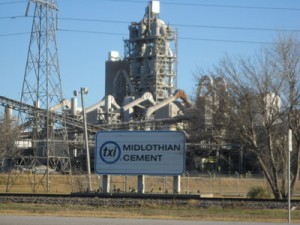Posts Tagged ‘Cement Industy’
TXI Stock Takes a Dive, New North Texas Cement Plant on Way?
 Last Wednesday TXI stock didn't do as well as Wall Street thought it should for the quarter and the result was about a 10% drop in value over one day's trading. On a Thursday conference call, CEO Mel Brekhus defended the company's prospects, including the opening of its new Central Texas plant, saying it "was the most successful of any he had been involved with in his career." We imagine that's right since the only other plant the company has built recently was Kiln #5 in Midlothian which faced opposition from Downwinders and others in the early part of the last decade.
Last Wednesday TXI stock didn't do as well as Wall Street thought it should for the quarter and the result was about a 10% drop in value over one day's trading. On a Thursday conference call, CEO Mel Brekhus defended the company's prospects, including the opening of its new Central Texas plant, saying it "was the most successful of any he had been involved with in his career." We imagine that's right since the only other plant the company has built recently was Kiln #5 in Midlothian which faced opposition from Downwinders and others in the early part of the last decade.
But most intriguing from DFW residents' point of view was the hint that Brekhus casually dropped toward the end of the call that the company was thinking about "increasing capacity" in North Texas. You know what that's code for – a new cement kiln.
Midlothian has been home to the nation's largest concentration of cement manufacturing for a long time, but such an addition would solidify its position for decades to come. That's because these days kilns come in one size – very, very large. A new TXI kiln would be massive in all respects. Air pollution would go up considerably, possibly canceling out some gains that have been made by the shutting down of the seven older wet Midlothian kilns that were ground zero for waste-burning from 1986 to 2008. Particulate Matter, smog-forming pollution and more exotic poisons like Dioxins would increase substantially.
Moreover, TXI might be looking for new ways to make money besides making cement – just like they did when they turned their kilns into hazardous waste incinerators for profit. Around the world the cement industry is focusing a lot of effort into becoming waste incinerators for municipal solid wastes, medical wastes and "unrecyclable plastics." Just like they did when they were burning hazardous waste, they charge customers for the right to burn their garbage. TXI recently expanded their list of fuels to include car parts and plastics. Might a new kiln increase the need to develop even larger markets for waste to burn?
It could be PR talk for the investors or reflect real corporate thinking at TXI headquarters. As part of their planning, executives would be advised to also think about the opposition to such a plant now. Midlothian is a different place than it was even 13 years ago, much less 25. People who've moved there recently might not want to see a new source of air pollution, especially one devoted to being a garbage burner. It's not quite the company town it was. And instead of facing a fledgling group, they'd be up against an organization that knows how to win the war. Stay tuned.
